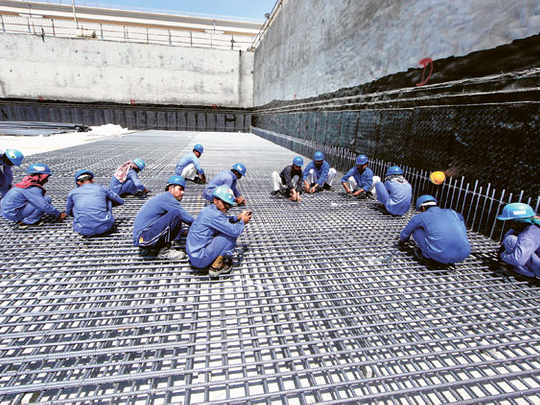
Dubai: Investment opportunities worth more than $500 billion (Dh1.83 trillion) in energy, transportation, education, health care and other critical sectors of economic development continue to beckon for contractors in the Gulf, industry experts said.
"GCC countries have significant trade surpluses which they are planning to invest in order to diversify their economies' dependence on oil revenues and also to develop their countries and satisfy the demands of their people following the Arab Spring. The region certainly is expected to continue to offer a lot of opportunity for contractors," said Rizwan Shah, managing director, Corporate Finance, and leader of Deloitte's Capital Projects Advisory services practice for the Middle East.
Despite grappling with challenges and delivery issues related to current projects, major opportunities remain prevalent in Saudi Arabia, Qatar, Abu Dhabi and Iraq this year.
Shah said the UAE is ranked the second largest market with investments worth $9 billion allocated to buildings, infrastructure and energy in the first quarter.
Abu Dhabi in particular accounted for 70 per cent of the $20 billion in contracts awarded between first and third quarters of 2011.
Driving this growth, with over $12 billion in awarded contracts, the emirate is placing "particular attention on transport, utilities and social infrastructure," Shah said.
Of the biggest investments currently underway is Qatar's plan to spend $100 billion in preparation to host the 2022 World Cup and Saudi Arabia's capital spend programme approaching $400 billion over the next ten years.
Laurie Voyer, CEO and managing director of Al Habtoor Leighton LLC, said: "The market is probably best described as challenging. The challenges we're facing now, as described above, will remain for the foreseeable future."
Area of growth
However, he said significant opportunities still exist — particularly in Qatar, Saudi Arabia and Iraq — and for those who are able to demonstrate that they can deliver to an international standard, the region can still be an area of growth."
Backed by vast oil-based reserves and government stimulus packages, Deloitte's latest report said that the economic prospects of the GCC region have remained positive despite ongoing political unrest in the wider Middle East.
"The oil and gas exporting countries, such as Saudi Arabia, Qatar and Abu Dhabi, have an additional objective which is the need to diversify their economies away from the traditional petrochemical and hydrocarbon industries.
"This is also driving infrastructure spending in these countries.
"These countries are now looking at how to take advantage of existing strengths to develop upstream industries — and the focus has shifted to construction," Shah said.
Construction contracts alone worth $40 billion were awarded to contractors in the first quarter of 2011, 47 per cent of which were in the energy sector.
"The region certainly is expected to continue to offer a lot of opportunity for contractors," said Cynthia Corby, audit partner Deloitte Middle East and leader of the construction industry for the UAE.
The report indicates that there are vast opportunities across the Middle East, with longer term infrastructure investment plans for the region estimated to be in excess of $1 trillion.
In terms of projects in the pipeline across the Middle East, the majority are social (36 per cent); 29 per cent power-related; 13 per cent in transport and 13 per cent in oil and gas.
Budget value of contacts to be awarded in Saudi Arabia in 2011 onwards is set to increase to $35 billion, as compared to $25 billion in 2006.
The government is undertaking grand investments, with plans nearing $400 billion in five years, demonstrating an increasing trend of projects that will need to be awarded in the coming years ahead. The construction market is therefore expected to be one of the most buoyant in the world.
Qatar holds an eight per cent share of the value of the regional projects. Projects planned to be underway in the future are valued at approximately $230 billion.











